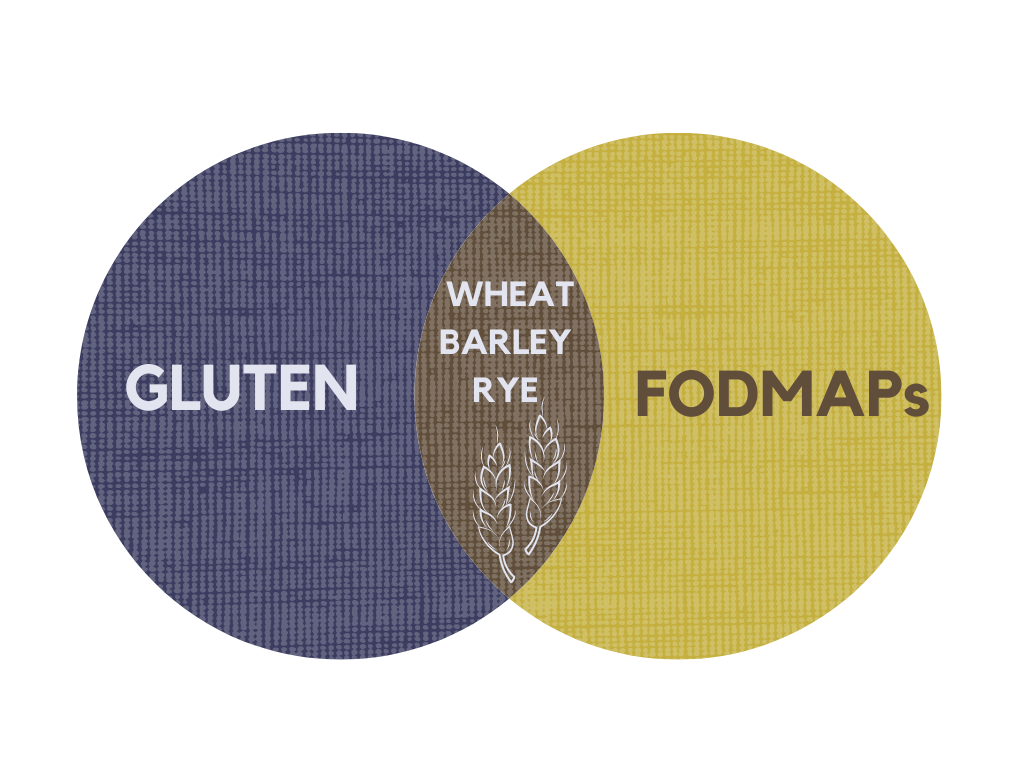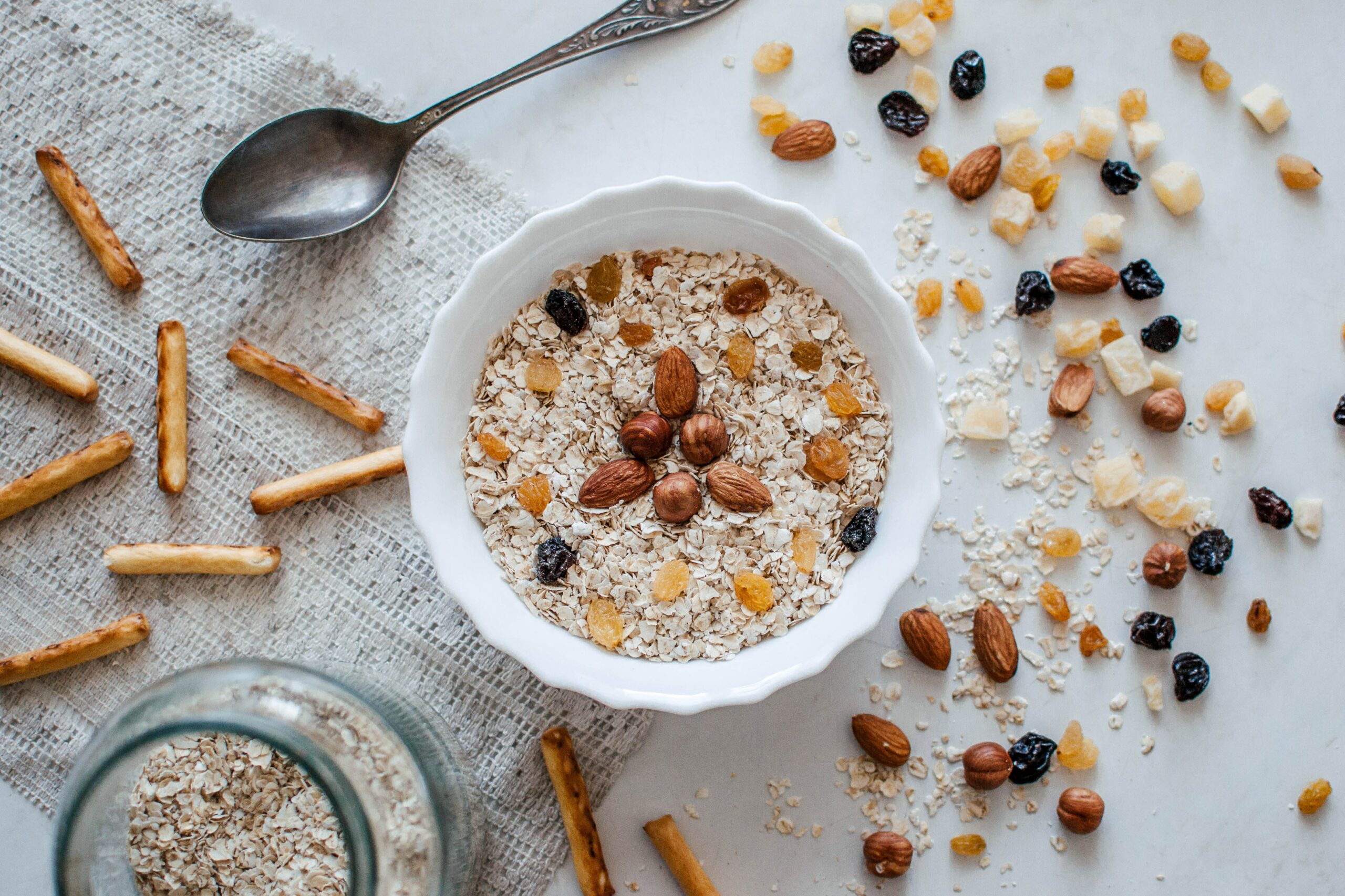This post is by Autumn Rauchwerk with support from me! – Kate Scarlata MPH, RDN
Understanding oats and gluten contamination
Oats are a naturally gluten free grain, however, they can be contaminated with gluten in the fields where they are grown or during the manufacturing process where they may be processed in the same facilities as gluten-containing grains like wheat, rye, and barley.
For those following a low FODMAP diet only, choice of oats doesn’t really matter. The low FODMAP diet is a diet focused on the carbohydrates in a food, and gluten, a protein, is not the focus of this science- based diet for IBS.
But for those following a gluten free diet, particularly those on a strict gluten free diet due to celiac disease, selecting and procuring gluten free oats is a bit more complicated.
Both individuals on a low FODMAP diet and those with celiac disease are advised to not consume wheat, barley, and rye. However, the rationale for this diet modification is often for different reasons. For those with celiac disease, avoiding these grains is essential as they all contain gluten, a protein, which can trigger an immune reaction in the intestine, leading to inflammation. For those on a low FODMAP diet minimizing wheat, barley and rye is recommended due to the carbohydrate (fructan) component of these grains.
The science behind the celiac response
For a little deeper dive into the science, individuals living with celiac disease have a sensitivity to certain sequences of amino acids found in the prolamin fraction of wheat, barley and rye. The prolamin in wheat is called gliadin. In rye, the prolamin is called secalin and in barley, the prolamin is called hordein.
When consumed in an individual with celiac disease, these prolamins can trigger inflammatory changes to the lining of the small intestine that can lead to the poor absorption of nutrients. Oats contains the prolamin avenin. This prolamin is tolerated in most with celiac disease, but not in all, and this is why dietitians may hold off initially from including oats in a person newly diagnosed with celiac disease.
Although oats contain approximately the same amount of protein as wheat, rye, and barley, they do not contain the same amount of prolamin. Wheat, rye, and barley prolamins account for 30% to 50% of total protein, whereas oat prolamins account for only 10% to 15%. For this reason, it is possible that if the prolamin in oats is harmful to those with celiac disease, it may require a larger portion size to cause the same adverse consequences as when that person eats wheat, barley or rye. Not everyone with celiac disease will have a problem consuming oats, but some people may react to oats in their diet and have avenin-reactive mucosal T-cells that can cause intestinal mucosal inflammation.
The bottom line: many people with celiac disease can tolerate oats, but some cannot. If you have celiac disease and tolerate oats well, it is important to ensure minimal risk of gluten contamination in the oats you purchase. Read on to learn more about how to do this.
Choosing the best oats to combat gluten contamination.
Oats marketed as gluten-free in commercial goods are often sorted through mechanical or optical sorting, where wheat, barley, and rye kernels are removed at the processing facility based on different physical characteristics. These processes do not take precautions against contamination from other crops in the field and may not remove all gluten-containing contaminants when the oats are processed.
For those following a strict gluten free diet, one should select oats that have been tested with a rigorous protocol to ensure they are gluten free. This process in oats is called the purity protocol.
Who sells purity protocol oats?
This isn’t as easy as it should be – there is no “purity protocol” label on food packages, so the oat source for a product is not immediately obvious. Registered Dietitian Tricia Thompson, a well-known expert on gluten contamination in foods and her organization Gluten-Free Watchdog provides food testing data to help consumers who must avoid gluten make more informed choices.
What are the Gluten-Free Watchdog’s recommendations when it comes to oat selection? Tricia Thompson notes, “We remain supportive of the use of purity protocol oats sourced from GF Harvest, Avena Foods, Montana Gluten-Free Processors, Glanbia Nutritionals, and MGM Seed & Grain Purity Protocol Oats by persons with celiac disease and gluten-related disorders who tolerate oats. With the exception of Quaker gluten-free oats, we are NOT supportive of the use of any other product containing mechanically/optically sorted oats.” Of note, Quaker Oats has been transparent with their rigorous testing protocol.
Selecting the products using purity protocol oats and what questions to ask food manufacturers
In an article on Gluten-Free Watchdog, Ms. Thompson outlines vetted oat products, and she recommends calling the manufacturer for products not listed on her site. “If the source of oats is important to a consumer, they should ask the manufacturer if ALL oats used in their labeled gluten-free products are purity protocol oats. Some manufacturers use more than one supplier of oats.”
To ensure best practices for gluten-free oat use, Ms. Thompson says, “it also is important to ask the manufacturer to name their supplier of purity protocol oats. The supplier should be included in the list on Gluten Free Watchdog (these suppliers are well vetted). If the manufacturer states that the name of their supplier is proprietary, then they don’t deserve the business of folks with celiac disease.”
Key questions to ask the food manufacturer:
- Do you use purity protocol in all of your sourced oats?
- What supplier(s) do you use?
- Do you disclose your testing protocol?
Once you gather this information, check link here to ensure that the oat supplier is Gluten-free Watchdog’s vetted list.
The GlutenfreeWatchdog.org is a great resource for those following a strict gluten free diet.
Gluten Free Watchdog, LLC was founded by Tricia Thompson, MS, RD to make state-of-the-art gluten-free food testing data available directly to you, the consumer.
This can be a confusing topic, and I’m happy to answer any questions you might have. Feel free to post your questions in the comments below!
Also, in other news for people living with Celiac disease or for healthcare providers that work in GI, I wanted to share this upcoming complimentary webinar about mental health and dealing with chronic disease:
The Harvard Medical School Celiac Research Program and the National Celiac Association invite you to the All Things Celiac: “A New Perspective: The Psychology of Dealing with a Chronic Disease” webinar on Thursday, December 17th from 1-2:15pm EST.
Optimum health for people with celiac disease includes good mental health. Join Sarah Ballou, PhD, director of Gastrointestinal Psychology Services at Beth Israel Deaconess Medical Center, and Mary Shull, MD, pediatric gastroenterologist at Children’s Hospital Colorado, for a compelling session on “A New Perspective: The Psychology of Dealing with a Chronic Disease.” Dr. Shull will discuss what is known and still unknown about mental health conditions among children and adults with celiac disease and how celiac disease affects health-related quality of life at diagnosis and after starting the gluten-free diet. Dr. Ballou will share how gastrointestinal psychology treatment, including cognitive behavioral therapy, is used in celiac disease as well as hands-on breathing techniques that can help common gastrointestinal symptoms. Lee Graham, Executive Director of the National Celiac Association will introduce the webinar and Amelie Therrien, MD, a gastroenterologist in the Celiac Center at Beth Israel Deaconess Medical Center, will moderate the session.
Continuing Education Units (CEUs): 1 CEU for Registered Dietitians (pending); 1.5 CEUS for Registered Nurses.
To register for this free webinar, please visit: https://partners.zoom.us/webinar/register/WN_W3Ip6rUlT6qb3Khm8EqVbQ
References:
- Thompson T. Oats and the gluten-free diet. J Am Diet Assoc. 2003 Mar;103(3):376-9. doi: 10.1053/jada.2003.50044. PMID: 12616264.
- Arentz-Hansen H, Fleckenstein B, Molberg Ø, et al. The molecular basis for oat intolerance in patients with celiac disease. PLoS Med. 2004;1(1):e1. doi:10.1371/journal.pmed.0010001
- https://www.glutenfreewatchdog.org/news/oats-produced-under-a-gluten-free-purity-protocol-listing-of-suppliers-and-manufacturers/
- https://www.glutenfreewatchdog.org/news/oats-and-the-gluten-free-diet-qa-part-1/
- https://nationalceliac.org/nca-stance-on-gluten-free-oats/


Dee Shea
Kate,
These cookies are delish. A batch just came out of the oven. Yum! My husband has no idea that they are gluten free.